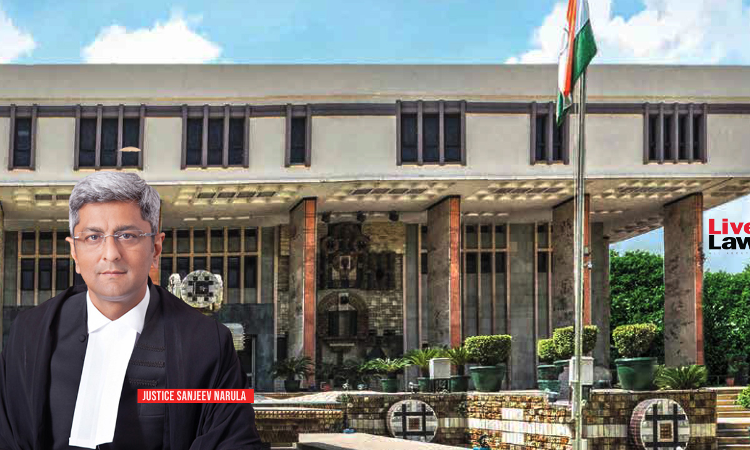- Home
- /
- High Courts
- /
- Delhi High Court
- /
- Delhi High Court Orders Counselling...
Delhi High Court Orders Counselling Of POCSO Victim Raped By Elder Brother, Orders Disbursement Of ₹13 Lakh Compensation
Nupur Thapliyal
9 Sept 2025 9:30 AM IST
The Delhi High Court has directed the Delhi State Legal Services Authority (DSLSA) to appoint a support person and provide counselling to a POCSO victim and her family in a case where she was repeatedly raped by her biological elder brother when she was a 15 year old minor, leading to her pregnancy which was later aborted.Justice Sanjeev Narula asked the DSLSA to coordinate counselling for...
The Delhi High Court has directed the Delhi State Legal Services Authority (DSLSA) to appoint a support person and provide counselling to a POCSO victim and her family in a case where she was repeatedly raped by her biological elder brother when she was a 15 year old minor, leading to her pregnancy which was later aborted.
Justice Sanjeev Narula asked the DSLSA to coordinate counselling for the Prosecutrix, her parents and sister through a qualified clinical psychologist or psychiatric social worker experienced in child sexual-abuse cases.
It said that the counsellor shall also advise them on educational or vocational continuity and any further medical or legal assistance needed.
“If not already done, the DSLSA shall facilitate the disbursement of the compensation amount of INR 13,50,000/- awarded to the Prosecutrix by the Trial Court, vide order on sentence dated 17th January, 2025. The DSLSA shall also ensure the opening and/or verification of a protected bank account in the name of the Prosecutrix and complete the disbursal process within eight weeks from the date of this order, if not already effected,” the Court further said.
Justice Narula noted that the Prosecutrix, her sister and their parents stood together not to press accusation, but to seek the convict's release. The Prosecutrix, though no longer a child in years, yet plainly fragile, spoke in a low voice, visibly anxious, her thumbs nervously twisting, it noted.
“Such dynamics are, sadly, not uncommon. Intra-familial abuse is often shrouded in silence- silence borne at the child's expense, where duty recasts as protection of the adult, and fear that the truth, if spoken, will shatter what remains of the family. Such abuse rarely ends at the bar of law; it fractures a household, reorders loyalties, and can still silence the very voice the statute is designed to protect,” the Court said.
It added that Courts cannot mend what is broken at home and that the message must remain unambiguous that a child's bodily integrity is inviolable.
“Compassion for a family in anguish cannot translate into impunity for harm done to a child. The law's foremost duty is to safeguard the child's dignity and safety. That duty is only partly discharged through punishment; it also demands measures of care and rehabilitation,” it said.
The Court dismissed the accused's plea challenging his conviction and sentence of 20 years of rigorous imprisonment and Rs. 2,000 fine in the case. In December 2024, he was convicted for the offences punishable under Section 6 read with Section 5(j)(ii) and Section 5(l) of the POCSO Act, 2012.
In 2020, an information was received from a hospital that a mother had brought her minor daughter for termination of her pregnancy. It was found that the prosecutrix, who was a minor then, was 22 weeks pregnant.
In the presence of her sister and father, the victim gave a written complaint alleging that her elder brother, the convict, had subjected her to sexual assault on two or three occasions, including once shortly after Holi.
It was the convict's case that his conviction was unsustainable in law, being founded solely on DNA evidence, without adequate corroboration from oral testimony. He submitted that although the Prosecution had 12 witnesses, but none of them succeeded in establishing the case beyond reasonable doubt.
Upholding the conviction and sentence, the Court said that allegations of sexual assault within the immediate family often attract extraordinary pressures- emotional, social, and economic, and it is not uncommon for family members to retract or dilute earlier allegations to shield the accused from penal consequences.
It noted that a coordinated change of stance across immediate family members in the case gave weight to the possibility of an attempt to protect the convict and thus, the contradictions could not be treated as fatal to the case of the Prosecution, particularly when other corroborative and scientific evidence was available on record.
Further, the Court noted that a cumulative assessment of the FSL report and the deposition of the Senior Scientific Officer left little room for doubt that the convict was the biological father of the foetus that was aborted by the Prosecutrix.
“The DNA profile exhibited a 50% match with the Prosecutrix and a 50% match with the Appellant, the classical signature of biological parentage. This clarification underscores the evidentiary weight of the report, ruling out any competing hypothesis consistent with innocence,” the Court said.
As the Court denied relief to the convict, it directed the Superintendent of Jail to ensure that the convict has access to appropriate counselling and correctional programmes during his incarceration.
Title: ASHISH v. STATE OF NCT OF DELHI
Citation: 2025 LiveLaw (Del) 1073



